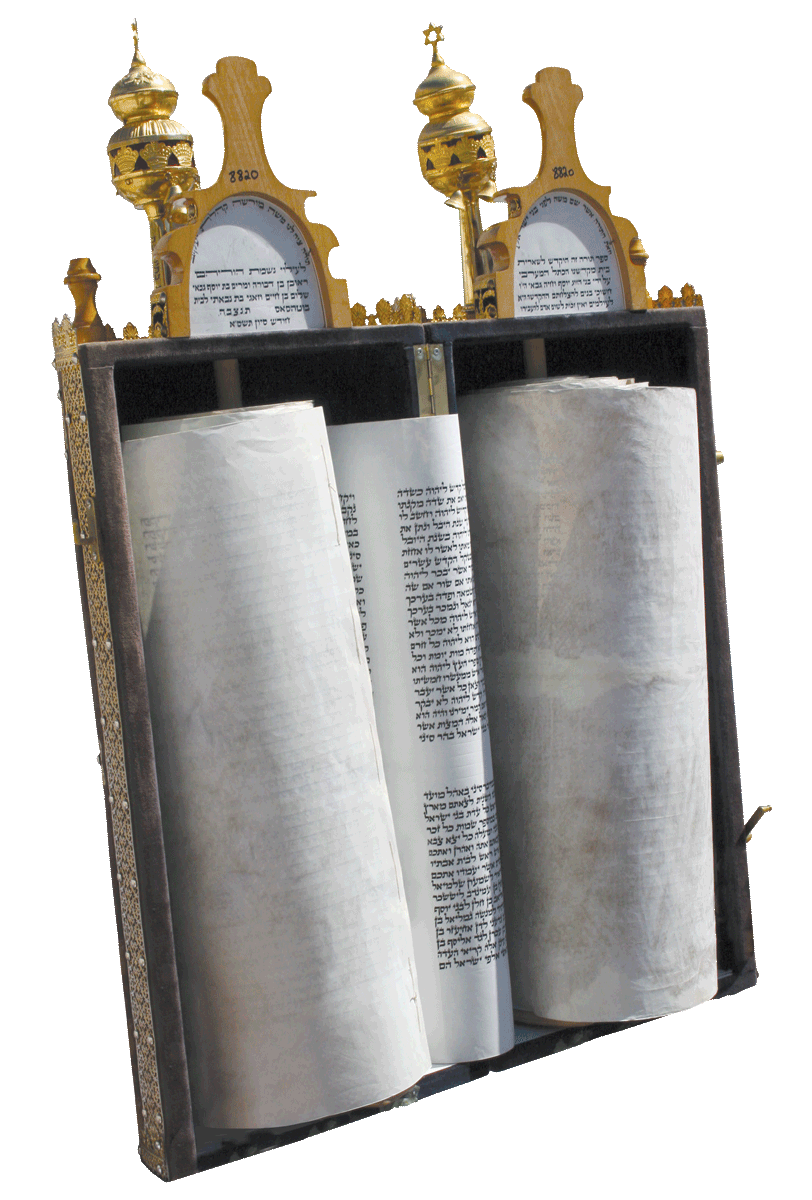The Old Testament
An Overview
The Old Testament is divided into five parts: the Pentateuch, the Historical books, the Psalms, the Wisdom books, and the Prophets.
The Pentateuch
The first five books of the Bible (Genesis, Exodus, Leviticus, Numbers, and Deuteronomy) are often referred to as the “Pentateuch” (the “five scrolls” or five-scroll collection). In the Hebrew Scriptures, these books are referred to as the “Torah,” meaning the “teaching” or “instruction.” These books tell the story of God’s creation of the world, of human sin and rebellion against God, of God’s covenant with Abraham, of God’s deliverance of his people from slavery in Egypt, of God’s covenant with Moses, of God’s laws for his people, and of his peoples’ journey to the promised land. The last book, Deuteronomy, spells out the blessings and penalties for keeping or rejecting the Mosaic covenant.

A modern Hebrew Bible scroll
The Historical Books
The Old Testament books from Joshua through Esther are known as the “Historical books.” The first group of books (Joshua through 2 Kings) is closely connected to the book of Deuteronomy and continues the story of the Pentateuch. In essence, Deuteronomy closes by posing an important question, “Will Israel be faithful to the Lord and his laws (the Mosaic covenant)?” The tragic answer is no, they will not remain faithful, and 2 Kings ends with the destruction of Jerusalem and the exile of Israel from the promised land. The second group of Historical books (1 Chronicles through Esther) is written from a different perspective. These books focus on those who have returned to the land after the exile, encouraging them to remain faithful to the Lord.
The book of Psalms is unique and cannot be placed in any of the other Old Testament categories. It stands alone as a book of songs of praise, testimony, and lament. The Psalms were (and are) used both in public worship and private meditation.
The Wisdom Books
The Wisdom books (Job, Proverbs, Ecclesiastes, and Song of Songs) remind God’s people of the importance of listening, thinking, considering, and reflecting. Their purpose is to encourage the development of both godly character and the ability to make wise decisions in a variety of circumstances. Proverbs presents basic principles of life—things that are normally or usually true—while the other three books treat exceptions to these rules: Job (when the righteous suffer), Ecclesiastes (when a rational approach to life doesn’t provide all the answers), and Song of Songs (concerning the “irrationality” of romantic love).

The exact location of Mount Sinai is unknown. There are numerous mountain peaks in the Sinai desert that could be the mountain on which God appeared to Moses and Israel. Shown in this picture is a peak called Jebel Musa (“mountain of Moses”), which some believe is Mount Sinai.
The Prophets
After entering the promised land, Israel turns a deaf ear to God’s instructions and follows other gods. As the nation spirals downward, God sends the prophets with a final message for his people: (1) you have broken the Mosaic covenant through idolatry, social injustice, and religious ritualism, and you need to turn back to a true worship of God; (2) if you fail to repent, then you will face judgment; and (3) there is still hope beyond judgment for you—a glorious, future restoration for God’s people and for the nations. This standard prophetic message is repeated throughout the Prophets. But people continue to rebel and face judgment, which comes in the form of two invasions: the Assyrians in 722 BC to destroy the northern kingdom of Israel and the Babylonians in 587/586 BC to destroy the southern kingdom of Judah and the city of Jerusalem. The prophets also promise a time of future restoration, including a new covenant that will involve all the nations of the world. This fulfills God’s original promise to Abraham in Genesis 12:3.